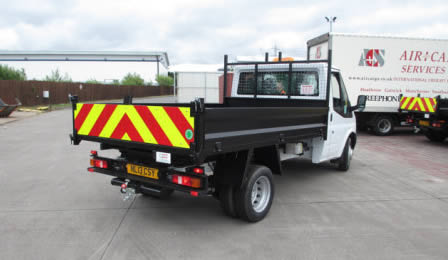
When choosing a new vehicle or a fleet of new vehicles, there will be several considerations based on the business’s size, sector, customer base, employees and budget, all of which will play a role in what is chosen.
While it is important to take all of these factors into account when investing in new vehicles, another major consideration is compliance with legislation, particularly for businesses that operate in sectors and are involved in projects where red tape is burdensome, such as construction and highway maintenance.
This can often involve operating in high-risk areas and in situations where heavy loads, restricted spaces and other limiting criteria are in operation.
It is therefore often essential to have relevant processes, warning and safety signage and livery in place at all times, in order to conform with both the law and the requirements of the job.
Livery
Having the correct livery in place does not only help a company to advertise its service or product and attract new customers, but can also be integral in ensuring the organisation is not breaking the law.
Chapter 8 livery is a requirement for any vehicle parked on the side of a road for works or inspection where the speed limit is above 50mph, but is advisable for all roads, regardless of the limitations.
Yellow high visibility side stripes can also be added to vehicles that will be parked or operating in areas with high traffic volumes and can help to ensure the safety of people within the vehicles, as well as fellow road users.
The addition of beacons can also help to further alert motorists to the presence of a parked vehicle as well as its movements, as it is pulling off the motorway onto the hard shoulder or construction site.
For businesses that land construction or maintenance contracts at short notice, there can often be long lead times to have equipment fitted to vehicles, but Northgate strategically positions its vehicles so that specialist vehicles with conforming markings can be conveniently accessed.
One of our customers, Warmer Energy Services, required increased flexibility to match its rapid expansion, as well as specialist equipment and livery, which Northgate was able to provide following consultation. This not only helped the company to comply with legislation, but also delivered 100 per cent fleet utilisation and a reduction in rental costs.
Loading
For companies that transport a significant amount of material or whose employees regularly use heavy or specialist equipment, implementing safe loading and unloading processes is essential.
Larger vans such as Lutons can therefore come fitted with a tail-lift, which can ensure easier and safer loading and unloading to not only safeguard the material, equipment or product being relocated, but the workers who are moving it.
Alternatively, high payload Lutons with lower floor heights can be advantageous by removing the need for lifting above a certain height and provide the added bonus of being able to fit more in the back of the van, reducing the need for multiple journeys.
Northgate offers a range of Lutons and large vans that suit a wide variety of customer requirements and can ensure product safety, safe loading, the wellbeing of workers and other road users.
Specialist equipment
Sometimes a specialist project or line of work requires specialist equipment, and a vehicle that can provide that equipment can save time and boost safety.
Welfare vans can be equipped with a variety of safety apparatus and equipment that can not only act as a mobile staffroom, but also help to provide convenience for workers who require it.
Exterior features can include chapter 8 livery, reverse parking sensors and manual side entry door steps and anti-slip coated steps. The interior can then be fitted with specific safety features including eyewash stations, a glass hammer, first aid kit, grab handles and a hand care system to ensure the continuous wellbeing of workers.
Northgate converted long wheelbase Ford Transit and Mercedes Sprinter vans can help to meet the particular requirements of businesses carrying out work in areas that need a welfare vehicle.
Any business knows that the safety of staff, customers and any road users or pedestrians is of paramount importance, and this extends to all areas of operation.
Having the right vehicles that meet and exceed safety legislation and fulfil the requirements of the job can help to provide continuous peace of mind.






